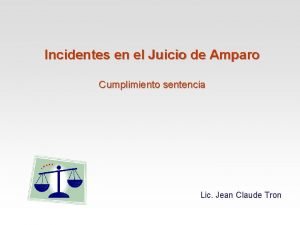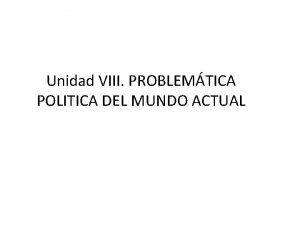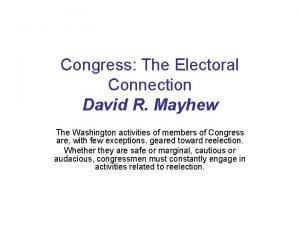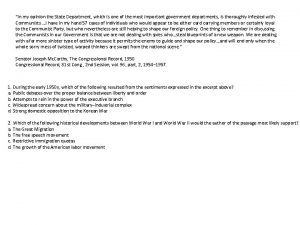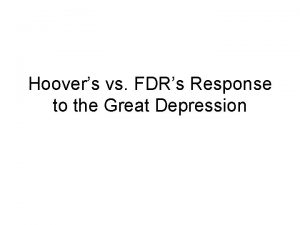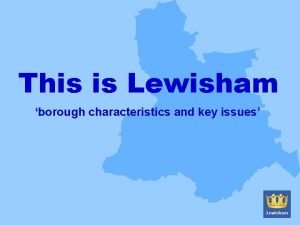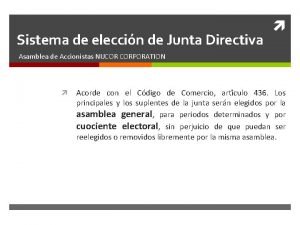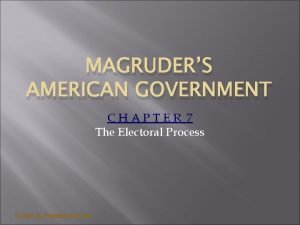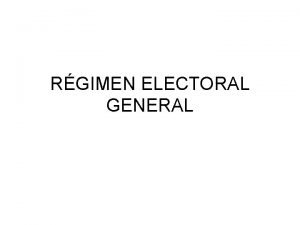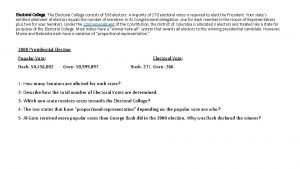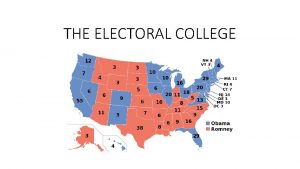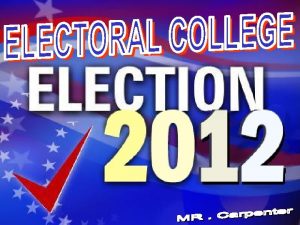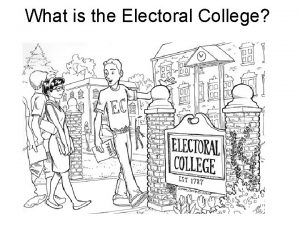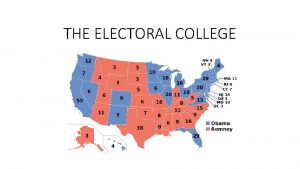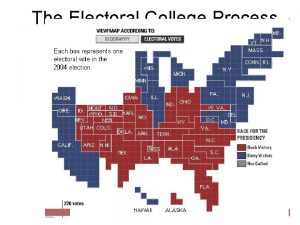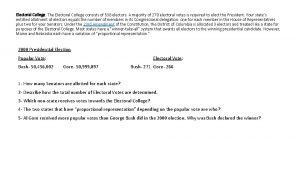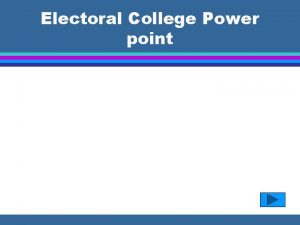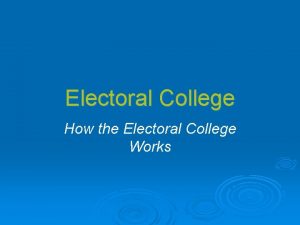THE ELECTORAL COLLEGE What is the electoral college













- Slides: 13

THE ELECTORAL COLLEGE

What is the electoral college and how are electors chosen? • The electoral college is a group of people chosen from each State and the District of Columbia to formally select the President and Vice President. • A presidential elector is one person of the electoral college group who cast the formal votes that choose the President and the Vice President. Electors are chosen by the results of the State popular vote on election day. • The Framers expected electors to use their own judgment, however most electors today are expected to vote for their party’s candidates. Political parties are greatly responsible for the selection of electors today.

How many electors does each state receive? • Each State receives as many electors as it has members of Congress. (Keep in mind this number can change every ten years based on reapportionment due to census numbers. ) • As a result, a State receives at least three electors. To calculate the electors for your state take the number of Senators (always two) and add that to the number of House of Representative members.

How many electors are needed to win? • There are 538 presidential electors. Victory requires one over half. So, a great deal of importance is placed on the concept of 270 to win. • Originally the Framers had electors cast two votes for president, each for a different person. The winner became President with second place becoming Vice President.

What impact did the rise of political parties have on the Electoral College? • The rise of political parties and the controversy created during the Election of 1800 resulted in a change to the original rule and the passage of the 12 th Amendment. • During the 1800 election, Thomas Jefferson and Aaron Burr tied, leaving no clear winner. According to the Constitution, the House of Representatives decide the presidency in the case of a tie or if no one receives more than one half of the votes. It eventually took 36 votes in the House to determine the winner. (For more information see the Constitution: Article II, Section 1, Clause 3, ) • The 12 th Amendment created separate electoral votes for President and Vice President.

What is the importance of winner-take-all? • The winner-take-all system gives all of a State’s electoral votes to the candidates who wins the popular vote of the State. Even if the candidate wins by one vote, they receive all of the votes. This system is used in most States today. • What does the graph on the right suggest about this system?

What are battleground/swing states? • In an attempt to achieve the required 270 votes to win, candidate campaigns create a strategy for victory. Decisions have to be made on how much time to spend campaigning in each state. Some tend to lean strongly toward one party; these are called safe states. Blue states are those that are safe Democratic states while red states are safe Republican states. Battleground states sometimes referred to as swing states are those that are up for grabs and generally decide the election.

Does the Electoral College still effectively select a President? Issues of the debate • Critics note that the electoral process does not always end up with the winner of the popular vote winning the electoral vote and the presidency. Critics argue that winner-take-all has made this a bigger concern. ØFour times in our history, the person with fewer popular votes became President through the electoral college system. The most recent example was the election between George W. Bush and Al Gore. ØFifteen times in our history, the winner of the election won the presidency with less than a majority of the popular vote.

Does the Electoral College still effectively select a President? Issues of the debate • Electors are not required by the Constitution to pick the winner of the popular vote in their State. Some state have tried to address this through state and party rules. Electors who don’t vote for the candidate they are pledged are referred to as faithless electors. • If an election goes to the House of Representatives, House votes are by State, not by individuals, which gives smaller States a larger influence, even with fewer people. If a majority of State representatives cannot agree on a choice, the State loses its vote. The House vote also requires a majority of 26 States, this could be very difficult process.

Does the Electoral College still effectively select a President? Issues of the debate • Proponents of the Electoral College believe that the system promotes Federalism and guarantees the roles of states in the process. • Proponents also identify the importance of the Electoral College in keeping all parts of the country involved in the process. They feel that the Electoral College forces candidates to pay attention to all states, especially in a close election. • Other proponents suggest that a direct popular vote election might actually add to the costs of campaigning since the state boundaries would not longer be relevant. There is also an increased likelihood of voter fraud.

Why did the Framers decide to use the Electoral College? The Framers of the Constitution debated whether to have the President chosen by Congress or by the popular of the people. • Opponents of congressional selection felt the separation of powers between the executive and legislative branches would be violated. • Opponents of the popular election felt that the people would not know enough about the candidates to make wise choices.

What do you think? • There have been over 700 suggestions in our history on potential changes to the electoral college system. • Among proposals include a district plan that would let every State congressional district select its own electors by popular vote. Another plan called the proportional plan would give each candidate a share of the electoral vote equal to the popular vote share received in the state. These would not guarantee the popular votes winner would win. Others want a popular vote plan; some are suggesting a plan that would keep the Electoral College but would require state give electors to the popular vote winner (National Popular Vote plan) • A complete change to a popular vote eliminating the Electoral College would require a constitutional amendment.

References • Information: Mc. Clenaghan, William A. Magruder’s American Government. Upper Saddle River, New Jersey: Pearson, 2013. • Additional Information: Dave Leip’s Atlas of U. S. Presidential Elections, http: //www. uselectionatlas. org; National Archives and Records Administration-U. S. Electoral College, http: //www. archives. gov/federal-register/electoral-college/about. html • Images provided by: • https: //en. wikipedia. org/wiki/Electoral_College_(United_States)#/media/File: Electoral. College 201 2. svg • http: //frontloading. blogspot. com/2012/11/2012 -electoral-college-wrap-up-part-2. html • http: //parade. com/470683/kmccleary/does-your-vote-count-a-look-into-the-electoral-college/ • http: //www. familysecuritymatters. org/publications/detail/the-electoral-college-is-under-attack • http: //frankkuchar. com/why-the-electoral-college-part-ii/ • http: //parade. com/470683/kmccleary/does-your-vote-count-a-look-into-the-electoral-college/
 Electoral college compromise 1787
Electoral college compromise 1787 Electoral college changes
Electoral college changes Materia electoral
Materia electoral Tipos de incidentes en materia electoral
Tipos de incidentes en materia electoral Geografía electoral
Geografía electoral Electoral connection definition
Electoral connection definition 1992 electoral map
1992 electoral map The 1964 electoral map above illustrates the
The 1964 electoral map above illustrates the Hoover v. fdr responses to the great depression
Hoover v. fdr responses to the great depression Largest borough
Largest borough Cuerpo electoral significado
Cuerpo electoral significado Elección de junta directiva por planchas
Elección de junta directiva por planchas Chapter 7 the electoral process
Chapter 7 the electoral process El flujograma de documentos electorales es
El flujograma de documentos electorales es



